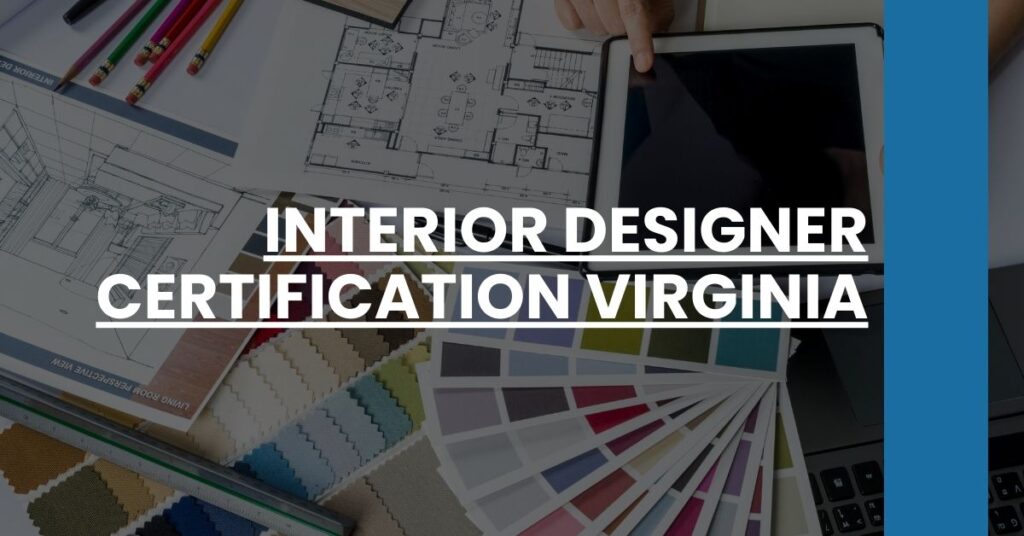Looking for programs in a specific city? Check out our lists of Interior Design Programs in Virginia Beach, Chesapeake, Norfolk, Arlington, Richmond, Newport News, Alexandria, Hampton, and Roanoke
Obtaining an Interior Designer Certification in Virginia isn’t just about meeting state requirements—it’s a key step for advancing your career. I’ve heard from many aspiring designers who feel overwhelmed by the certification process. It can definitely seem like a lot to manage!
Our team has put together a comprehensive guide to help you navigate these waters without hassle. In it, you’ll discover:
- The detailed steps to obtain your Interior Designer Certification Virginia.
- The education and exams required.
- How to document your work experience.
Whether you’re just starting or looking to advance your career, this guide has got you covered.
- Why Get Certified as an Interior Designer in Virginia?
- Understanding the Certification Requirements
- Accredited Interior Design Programs in Virginia
- The Interior Design Experience Requirement
- Preparing for the NCIDQ Examination
- Continuing Education and Professional Development
- Virginia’s Licensing and Registration Process
- Frequently Asked Questions About Certification
- Online Degree Programs for Interior Designers
- Looking for Interior Designer Information On States Bordering Virginia?
- Conclusion: Taking the Next Steps Towards Your Interior Design Career
Why Get Certified as an Interior Designer in Virginia?
Choosing to become a certified interior designer in Virginia can elevate your career, but why is it essential? Here are several compelling reasons:
Career Advancement
Increased Opportunities: Certification can open doors to a wider range of job opportunities. Many firms prefer or even require certified designers due to their verified skills and knowledge.
Higher Earning Potential: According to industry surveys, certified interior designers often command higher salaries compared to their non-certified counterparts.
Professional Credibility
Client Trust: Certification signals to clients that you have met stringent industry standards, increasing their trust in your professional skills.
Peer Recognition: Becoming certified also places you in an elite group of professionals who have demonstrated commitment and excellence in the field.
Staying Current with Industry Practices
Access to Resources: Certified designers gain access to exclusive resources, continuing education programs, and industry events.
Networking: Professional certification bodies and organizations offer networking opportunities that can lead to collaborations and new business ventures.
Understanding the Certification Requirements
To become a certified interior designer in Virginia, you must meet specific education, experience, and examination criteria.
Educational Requirements
Accredited Programs: You need a degree from a program accredited by organizations such as the National Association of Schools of Art and Design or the Council for Interior Design Accreditation.
Non-Accredited Programs: Graduates from non-accredited programs can still qualify by supplementing their education with sufficient work experience.
Experience Requirements
Minimum Experience: A minimum of two years of documented interior design experience is required. This can be achieved through internships, apprenticeships, or assistant roles.
Documentation: You must submit Experience Verification Forms to the Virginia Board for verification.
Examination Requirements
NCIDQ Exam: Passing the National Council for Interior Design Qualification (NCIDQ) examination is a pivotal step. The exam ensures that you meet national standards for interior design competency.
Accredited Interior Design Programs in Virginia
Several institutions offer accredited interior design programs in Virginia, providing excellent options for fulfilling your educational requirements.
Virginia Commonwealth University
Virginia Commonwealth University offers a bachelor’s degree in interior design accredited by both the National Association of Schools of Art and Design and the Council for Interior Design Accreditation.
James Madison University
James Madison University’s interior design program is also accredited and provides a comprehensive curriculum to prepare students for certification.
Marymount University
At Marymount University, students can pursue an accredited interior design degree that meets all the educational requirements for certification.
For more detailed information, visit interior design programs.
The Interior Design Experience Requirement
Practical experience is a cornerstone of the certification process.
Documenting Experience
Supervisor Verification: Your work experience must be verified by a certified interior designer or a licensed architect under whom you have worked.
Experience Forms: Complete Experience Verification Forms for submission to the Virginia Board.
Gaining Practical Experience
Internships: Many accredited programs offer internship opportunities that can count towards your experience hours.
Apprenticeships: Working as an apprentice under a certified professional can provide the practical experience needed for certification.
Assistant Roles: Entry-level positions as an interior design assistant can also help you accumulate the required hours.
Preparing for the NCIDQ Examination
The NCIDQ exam is a comprehensive test that assesses your knowledge and skills in interior design.
Exam Components
IDFX (Interior Design Fundamentals Exam): This portion tests your knowledge of basic design principles and theory.
IDPX (Interior Design Professional Exam): This section assesses your in-depth understanding of contract documents, codes, project coordination, and more.
PRAC (Practicum): The practicum evaluates your ability to apply your knowledge in practical scenarios through case studies.
Study Tips
- Create a Study Schedule: Consistency is key. Set aside specific times for study each week.
- Utilize Study Guides: Resources such as NCIDQ IDFX Sample Questions and NCIDQ IDPX Sample Questions can be invaluable.
- Practice Exams: Taking practice exams can help you identify weak areas and prepare effectively. Consider using the PRAC Practice Exam Problems.
For additional resources, check out these practice exams.
Continuing Education and Professional Development
Staying relevant in the rapidly evolving field of interior design requires an ongoing commitment to professional development and education.
Importance of Continuing Education
Licensing Requirements: Licensed interior designers in Virginia must complete 16 Continuing Education Credit Hours (CECH) every two years to maintain their certification. This ensures you stay updated with changes in the industry.
Professional Growth: Engaging in continuing education helps you expand your skills, adapt to new trends, and incorporate the latest design technologies. It also provides opportunities to specialize in niche areas within interior design.
Opportunities for Professional Development
Certified Education Providers: The Engineers and Surveyors Institute (ESI) offers qualifying courses and is recognized as a Certified Education Provider. Their courses cover essential topics such as building codes, sustainability practices, and advanced design techniques.
Workshops and Seminars: Attend workshops and seminars offered by professional organizations like the American Society of Interior Designers (ASID) or the International Interior Design Association (IIDA). These events provide hands-on learning experiences and let you network with peers and industry leaders.
Online Courses: Many accredited institutions provide online courses that count towards continuing education credits. These include courses on software tools like AutoCAD, 3D modeling, and virtual reality in interior design.
Self-Directed Learning: Books, journals, and online resources are excellent means for continuous learning. Subscriptions to industry journals such as “Interior Design Magazine” or “Architectural Digest” can help you stay updated on trends and technologies.
Virginia’s Licensing and Registration Process
Once you meet the educational and practical experience requirements, you must go through specific procedures to obtain your certification in Virginia.
Application Submission
Required Documents: You need to submit the Interior Designer Certification Application, Interior Designer Degree Verification Form, official transcripts, and completed Experience Verification Forms to the Virginia Board for Architects, Professional Engineers, Land Surveyors, Certified Interior Designers, and Landscape Architects.
Verification of Examination: Comity applicants must also submit the Verification of Interior Designer Examination and Certification form to demonstrate the passage of the NCIDQ exam.
Fees: Along with your application, you must pay the required fees, which may differ based on your application type (initial certification, comity, or reinstatement).
Reinstatement Process
Expired Certificates: If your certificate has expired for five or more years, you need to apply for reinstatement. This process requires completing new Experience Verification Forms covering the period from expiration to the present.
Additional Verification: You may need to provide additional documentation or proof of continuous practice, especially if you were practicing in another state.
TOEFL Requirements
Non-English-speaking Countries: Applicants from non-English-speaking countries must meet a minimum TOEFL score to demonstrate proficiency in English, ensuring effective communication in professional settings.
Frequently Asked Questions About Certification
What are the costs associated with becoming a certified interior designer in Virginia?
The costs can vary, but they generally include:
- Application Fees: These can range from $50 to $100 depending on whether you are applying for initial certification, comity, or reinstatement.
- NCIDQ Exam Fees: The total cost for the NCIDQ exam is approximately $1,065, which covers all three sections (IDFX, IDPX, and PRAC).
- Continuing Education Costs: These vary widely based on the course or program you choose.
How long does it take to become certified?
The timeframe can vary based on your educational background and prior experience. However, it typically takes:
- Education: 2-4 years to complete an accredited interior design program.
- Experience: A minimum of 2 years of practical experience.
- Examination: Time to prepare for and pass the NCIDQ exam can vary, generally taking several months.
How does certification impact your career?
Job Opportunities: Certification opens doors to more job opportunities with higher responsibilities and better pay.
Professional Recognition: It validates your expertise and commitment, enhancing your credibility in the eyes of clients and employers.
Networking: Certified interior designers can join professional organizations, providing opportunities for networking, professional development, and access to exclusive resources.
Online Degree Programs for Interior Designers
Online degree programs offer flexibility and can be an excellent option for those balancing other commitments or living in remote areas.
Benefits of Online Programs
- Flexible Scheduling: Online programs often allow you to work at your own pace, making it easier to balance work, studies, and personal life.
- Accessibility: These programs are accessible regardless of your location, eliminating the need for relocation.
- Cost-Effective: Online degrees can be more affordable compared to traditional in-person programs, saving on commuting and housing costs.
Considerations for Choosing an Online Program
Accreditation: Ensure the program is accredited by recognized bodies such as the Council for Interior Design Accreditation. Accreditation ensures the program meets industry standards and that your degree will be recognized by employers and certification bodies.
Course Content: Review the curriculum to ensure it covers all necessary areas, including design principles, technology, and practical applications. Look for programs that offer resources like virtual design labs and software training.
Support Services: Choose programs that provide robust student support services, including academic advising, career counseling, and technical help.
For more information about online programs, visit online design degree.
Looking for Interior Designer Information On States Bordering Virginia?
In addition to Virginia, we suggest looking for programs in nearby states.
- Interior Designer Certification Maryland
- Interior Designer Certification West Virginia
- Interior Designer Certification Kentucky
- Interior Designer Certification North Carolina
- Interior Designer Certification Tennessee
Conclusion: Taking the Next Steps Towards Your Interior Design Career
Becoming a certified interior designer in Virginia is a rewarding journey that opens the door to numerous professional opportunities and growth. With the right educational background, practical experience, and a commitment to continued learning, you can achieve certification and excel in this dynamic and creative field. Start your path today and make your mark in the world of interior design.

